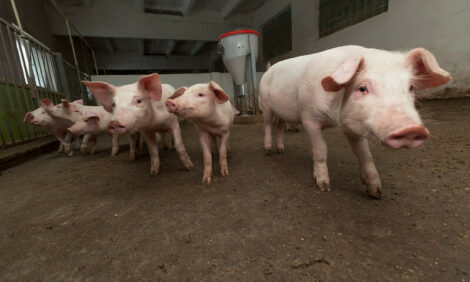



A new vaccine against piglet diarrhea is on its way
Research is underway to develop a new, effective vaccine against weaning diarrhea in piglets.
Department of Animal Science, Aarhus University, is part of a new project working on the development of a vaccine, which is expected to reduce the diarrhea-related piglet mortality by 90%. The new vaccine is expected to be launched in 2026. Photo: Anders Trærup, AU.
Diarrhea in piglets is a huge challenge in the pig production and is very expensive for the farmer every year due to the high mortality rate in the piglet pens and the use of large amounts of antibiotics. At the same time, the high use of antibiotics is a serious problem as it increases the development of antibiotic-resistant bacteria.
With support from the Ministry of Environment and Food’s Green Development and Demonstration Programme (GUDP), Statens Serum Institut (project manager) has entered a collaboration on the development of an effective vaccine against weaning diarrhea together with Aarhus University and SEGES. The diarrhea, which is caused by E. coli bacteria, typically arises shortly after the piglets have been separated from the sow. At this time, the piglets are no longer protected by antibodies from the sow and have not yet developed their own immune response. It should be possible to give the new vaccine, which Statens Serum Institut develops, to piglets very early in order to contribute to activating the piglets’ own immune response before they are weaned.
The new vaccine must be effective in the intestine
“So far, it has not been possible to vaccinate effectively against diarrhea, as antibodies, caused by help from traditional vaccines, cannot pass through the intestinal mucosa and thus cannot be effective where the pathogenic E. coli bacteria are,” says professor Charlotte Lauridsen from Department of Animal Science, Aarhus University. Charlotte Lauridsen leads the part of the project, which is about testing the new vaccine in pigs in the experimental facility in AU Foulum.
The project is about developing a completely new vaccine, which is able to pass through the intestinal mucosa. The way the vaccine works is that, at the time of injection, it affects some lymph nodes (which are involved in creating antibodies) in making them believe that they are placed in the intestine. In this way, it is possible to make the lymph nodes create antibodies, which can pass through to the intestines thus protecting the pigs from an intestinal infection. Statens Serum Institut has researched in this type of vaccine for human for many years, but now it is time to further develop the technique to include pigs.
“When the vaccine is ready for testing on pigs, it is our job in the project to study the vaccine’s effect in an infection study with E. coli. We use pigs born by our sows whom we know are genetically sensitive to E. coli, and we examine whether the vaccine protects the pigs from getting diarrhea after weaning,” says Charlotte Lauridsen.
Big perspectives
The vaccine is expected to be able reduce the diarrhea-related mortality in piglets by 90% and at the same time decrease the antibiotic consumption accordingly. The perspectives in the project are thus very clear. A markedly lower piglet mortality, better animal welfare and a drastic reduction in the antibiotic consumption in the pig production will be of high importance to the trade; every year, it uses 34 tons of antibiotics for treatment of piglet diarrhea. Simultaneously, it is possible to solve the problem with the environmentally damaging zinc which is used in the feed for piglets to prevent diarrhea and which is banned in the entire EU as of 2022. The new vaccine is expected to be launched in 2026, if everything turns out as expected.






